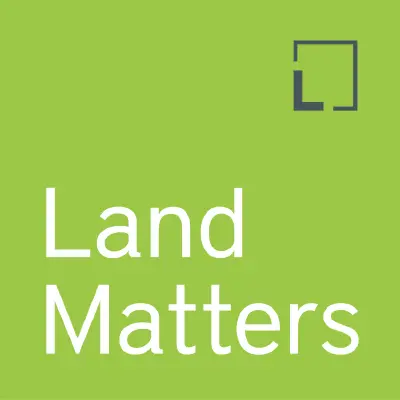
Land Matters
52 episodes Last Updated: Jun 04, 25
A behind the scenes look at what makes cities tick. Whether financing infrastructure, adapting to climate change, or building more affordable housing, a big part of innovative solutions can be traced back to land.
Episodes
Jun 04, 2025
New Era for New Urbanism
Demand for walkable urbanism is stronger than ever, according to Mallory Baches, president of the Congress for the New Urbanism, an organization that has been promoting compact, mixed-use, transit-oriented development for more than three decades.
Apr 16, 2025
Perpetuating the Providence Renaissance
At the helm in Providence,Rhode Island after 30 years of steady revitalization, Mayor Brett Smiley hopes to keep up the momentum while also addressing affordability and fiscal challenges. The latest municipal leader to be interviewed in the Mayor’s Desk series, he also talks bike lanes, nightlife, and the vagaries of community engagement.
Feb 17, 2025
Talking Tech for Cities
Rob Walker, author of City Tech: 20 Apps, Ideas, and Innovators Changing the Urban Landscape, reflects on how artificial intelligence could transform urban planning, along with other advances in technology that are poised to improve quality of life in cities.
Community Land Trusts, where homebuyers purchase homes but not the land underneath, is an affordable housing solution that deserves more attention, say the authors of a new report that reveals the critical ingredients for success.
Oct 03, 2024
Tishaura Jones, Winning St. Louis
St. Louis Mayor Tishaura Jones talks about regeneration strategies for the Gateway to the West, a postindustrial legacy city trying to bounce back from manufacturing and population loss. The interview is the latest in the Lincoln Institute’s Mayor’s Desk series, highlighting municipal chief executives from around the world.
Aug 07, 2024
Window on the World
Technological advances in satellite imagery and data management have boosted the field of geospatial mapping, making it possible to show all kinds of land uses across parcels, blocks, neighborhoods and regions. Jeff Allenby at the Center for Geospatial Solutions explains how the tools are helping local decision-makers understand property ownership patterns and the potential for much-needed new housing.
Jun 17, 2024
Reclaiming Black-Owned Land
As the US marks Juneteenth, self-described “death and dirt” attorney Mavis Gragg recounts efforts to secure title and reclaim legal ownership of Black-owned land, in the burgeoning field of heirs property.
May 13, 2024
The Hard-Charging Jacob Frey
An interview with Minneapolis Mayor Jacob Frey, who has led a pioneering zoning reform effort to increase housing supply, beginning with banning single-family-only zoning. As part of the “Mayor’s Desk” series of Q&A’s with municipal leaders, he also reflects on bike and bus lanes, regional governance, value capture for urban infill redevelopment, return to work, and the city’s infamous system of skyways.
Apr 16, 2024
Puzzling Out the Housing Crisis
Highlights from the Lincoln Institute’s Journalists Forum: Innovations in Affordability reveal emerging solutions to the extraordinary challenge of the housing crisis—reforming statewide zoning to increase supply, outmaneuvering institutional investors, shifting the property tax to a land value tax, and changing the home financing system.
Feb 02, 2024
COP28 and the Future of the Planet
An assessment of what was accomplished at the recent COP28 climate summit in Dubai, including more prominence for the critical issue of land use and cities, by four members of the Lincoln Institute staff who were there